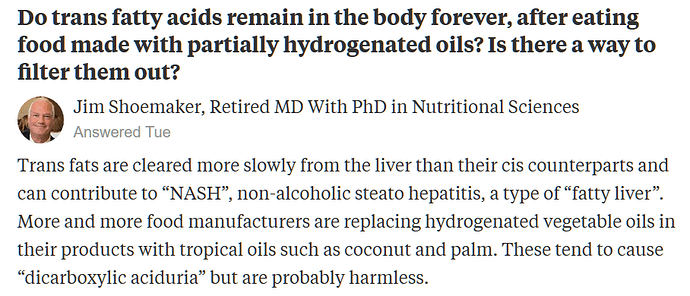What is this? First I’ve heard of it.
Dicarboxylic aciduria froom tropical oils?
A link would be helpful.
This is one of the reasons not to eat trans fats.
If you stick with the traditional cooking fats, butter, tallow, lard, and bacon grease, trans fats are not a concern. Also avoid the so-called “vegetable” oils (which the industry calls “seed oils” internally), because they contain a high percentage of ω-6 fatty acids, which cause inflammation when ingested in quantity.
Butter and tallow do have trans fats though. Should we not specifically mention INDUSTRIAL trans fats?
I suppose so, since they occur naturally, and haven’t been hydrogenated. If I understand correctly, the problem lies in the hydrogenation process, which randomly produces previously unknown compounds. Wheras butterfat and beef fat have been part of the human diet since forever.
Abstract
Dicarboxylic aciduria, an inborn error of metabolism in man, is thought to be caused by defective beta-oxidation of six-carbon to ten-carbon fatty acids. Oxidation of [1-14C]octanoate was impaired in intact fibroblasts from three unrelated patients with dicarboxylic aciduria (19 percent of control), as was the activity of medium-chain (octanoyl-)acyl-CoA dehydrogenase in the supernatants of sonicated fibroblast mitochondria (5 percent of control). These data confirm that dicarboxylic aciduria is caused by an enzyme defect in the beta-oxidation cycle.
This has nothing to do with trans fats and hydrogenated oils but is mentioned in relation to tropical fats and manufacturers moving towards using them as replacements. It’s not a common condition, otherwise it would be a big health concern in many parts of the world. What I get that it makes breaking down MCT impossible if you’re not producing a certain enzyme.

Thanks. I didn’t link because my screencap had everything involved in the source where I found it. I just thought folks here might be more familiar with it. I wonder how common that enzyme defect is. I mean I would have assumed all such things were rare until I started reading about the MTHFR stuff.
PJ
It’s one of several serious defects that can occur in the beta oxidation pathway. There are others that interfere with longer chain fats. Hypoglycemia is one problem. No beta oxidation means no glucose or ketones when food is scarce plus, like in the case of MCTs, cause a buildup of metabolites since they can’t be used.
Treatment involves avoiding long periods of fasting and restricting fat intake. MCADD is a known cause of sudden infant death syndrome (SIDS).
…
In the general population, MCADD occurs in approximately 1 in 50,000 individuals. The prevalence of MCADD in people of northern European descent has been estimated to be in the range of 1 in 6,400 to 1 in 46,000 individuals. Gypsies of Portugal and Native Americans of California also have a higher than average prevalence.
(LINK)
TL;DR
If you had a beta oxidation defect, you would likely have been diagnosed by now. It’s bad.
Thanks. This was in the context of several other genetic-related things I saw today that I found interesting, such as:
-
About 10% of the European population (mostly Scandinavian countries) are immune to the HIV virus. (Relates to a mutant gene in the people who survived the black plague. They think.)
-
Up to 1/3 of people of northern European ethnicity have a limited ability to absorb fructose. Allegedly many people diagnosed with IBS for chronic diarrhea etc. are actually suffering this.
-
For the MTHFR issue, some 30 to 40 percent of the US may have a mutation at gene position C677T. (Interesting since for official birth stuff they say it’s like <1%.) And it turns out this gene is extremely correlated with psychological issues of various kinds including anxiety, depression, bipolar and more. (I am interested in this because my daughter, who is half czech, is facing some issues I think might relate to this gene issue.)
That’s just trivia for today.
Nice! I have a C677T myself.
Speaking of trivia, rare diseases and beta oxidation…
Jamaican vomiting sickness
MCPA acts to inhibit the beta-oxidation of fatty acids in two ways. First, it interferes with the transport of long-chain fatty acids into the mitochondria. Also, it inhibits acyl-CoA dehydrogenases, so that only unsaturated fatty acids can be fully oxidized. https://en.m.wikipedia.org/wiki/Jamaican_vomiting_sickness
Bad fruit, BAD!
Thanks, that’s interesting. Learning to flip the switch of things like that, so to speak, would be real valuable.
The only studies I’ve seen so far are either in animal models (rat and mouse) or in vitro. There are case reports of various rare conditions involving errors in fatty acid metabolism, but I can’t tell how relevant any of them are to this discussion.
Is it a risk factor for type 2 diabetes and poor control in type 1?

